Number of Tropical Smoothie Cafe Locations in the United States of America
There are 1,638 Tropical Smoothie Cafe locations in the United States of America as of November 17, 2025. The state or territory with the most Tropical Smoothie Cafe locations is Florida, with 219 sites, accounting for roughly 13.4% of the total.
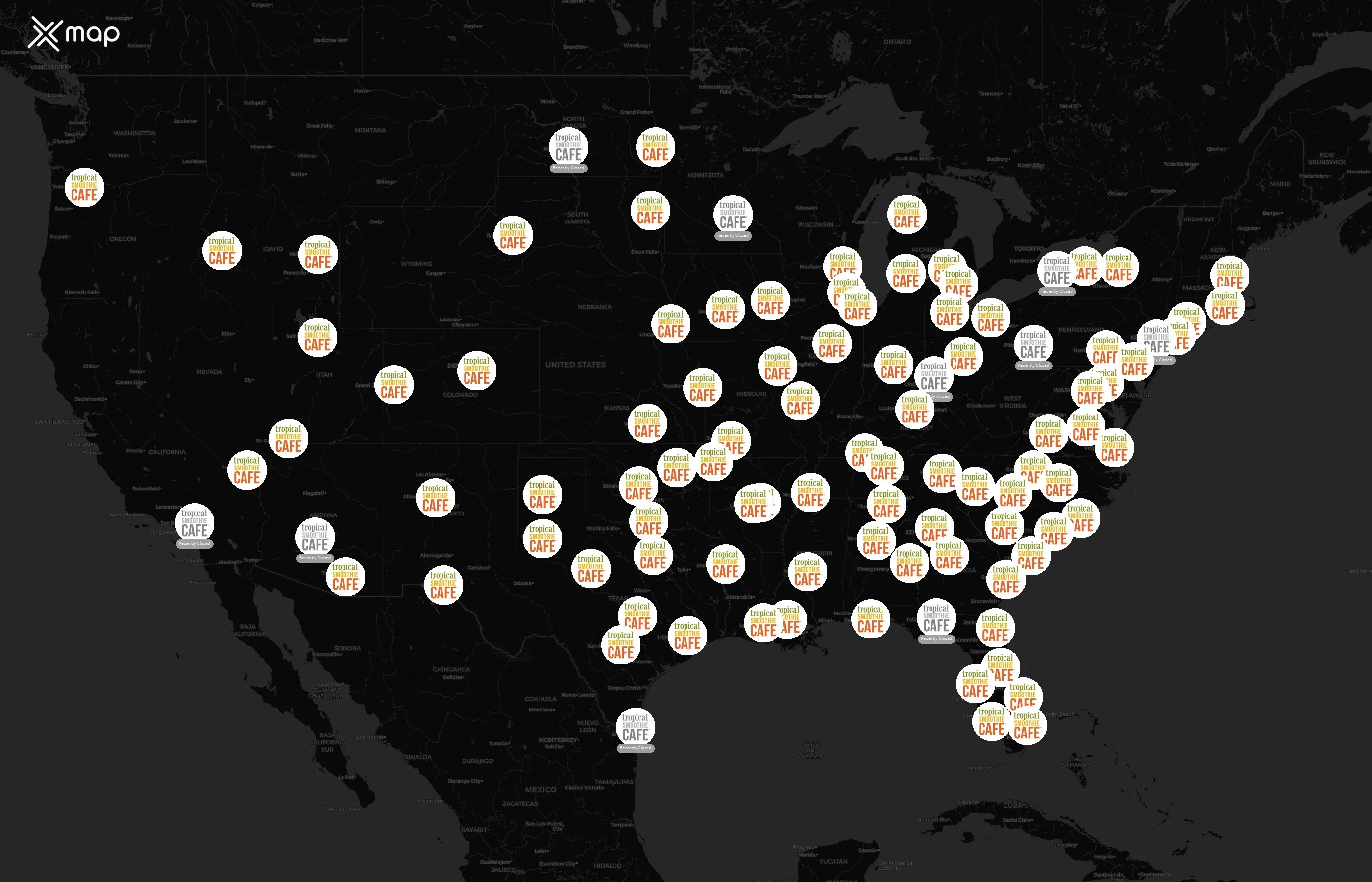
How many Tropical Smoothie Cafe are there in the United States of America?
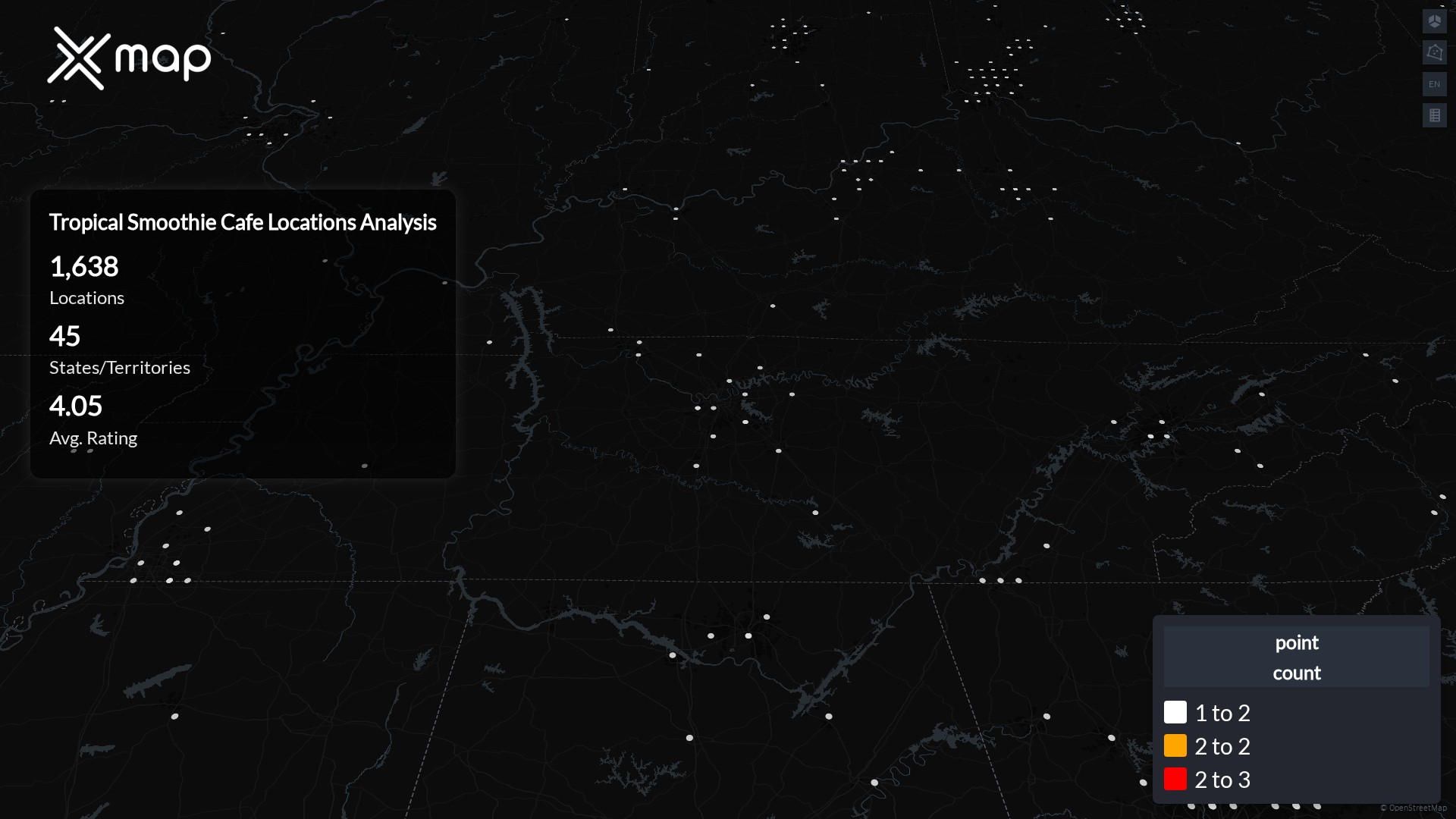
1,638
1,620
1,638
1,638
0
Distribution of Tropical Smoothie Cafe Locations Across United States of America by State
Tropical Smoothie Cafe operates 1,638 United States of America locations across 45 states. Largest clusters are in Florida, Texas, and Virginia; the top 10 states contain 63.1% of sites. Coverage is thinner in Minnesota, Washington, and West Virginia.
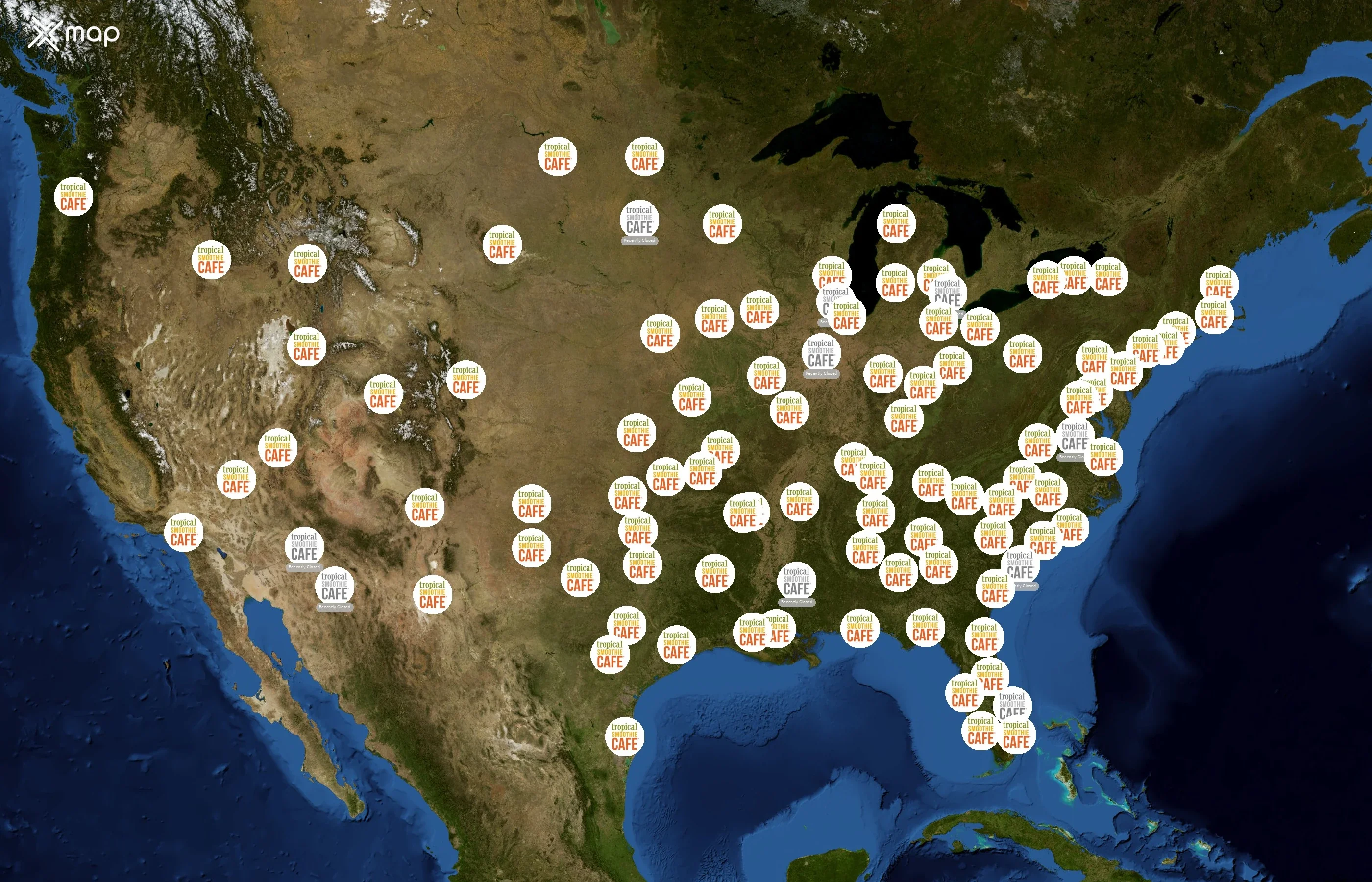
Top 10 States with the most number of Tropical Smoothie Cafe locations in United States of America
Tropical Smoothie Cafe shows strong visitor engagement: 800 locations are above the mean traffic score (mean: 52.2) and 251 qualify as highly visited.
Tropical Smoothie Cafe has 1,638 locations across the United States, with Florida leading at 219 locations (13.4% of total). Texas and Virginia follow with 151 (9.2%) and 124 (7.6%) locations respectively, making the top three states account for 30.2% of all locations. The top ten states collectively hold 63.1% of locations, with Virginia offering the best access at one location per 69,553 people. In contrast, California, Washington, and Minnesota have the most stretched markets, each with populations per location in the millions.
Tropical Smoothie Cafe per capita insights
- States (Virginia, Michigan, Arkansas) enjoy the best per capita access to Tropical Smoothie Cafe.
- States like Texas, Georgia, Ohio, Illinois, New York, despite their large number of locations, are under-served on a per-person basis, signaling potential demand for suburban expansion.
- Several states strike a balance between population growth and Tropical Smoothie Cafe density, making them hotspots for sustained competition.
Cities With the Most Tropical Smoothie Cafe Locations in the United States of America
Locations concentrate around major metros such as Oakland, Cook, Maricopa, Clark, and Suffolk. The top 10 cities account for 13.0% of U.S. sites.
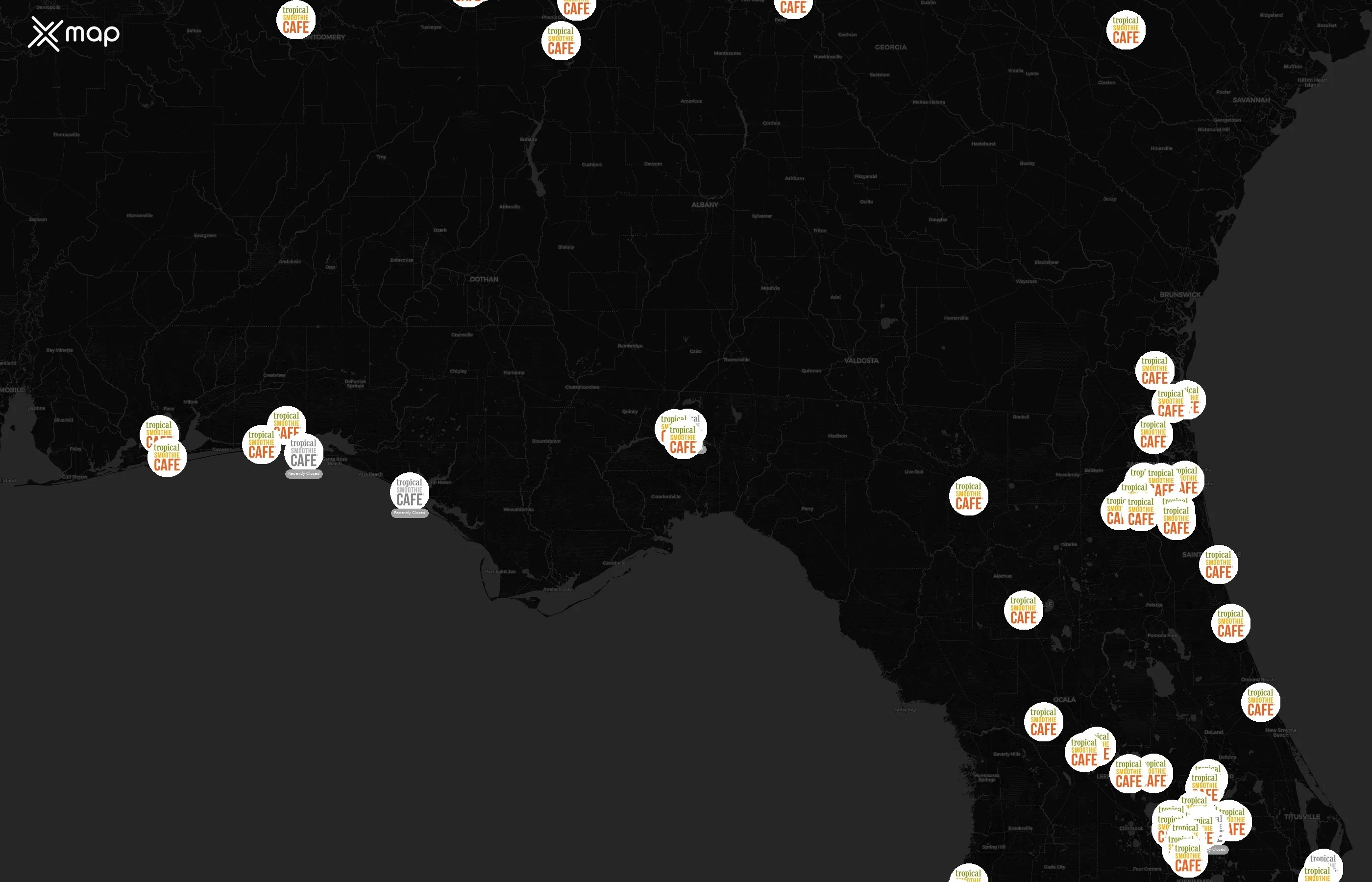
Top 10 Cities Ranked by Location Count
Tropical Smoothie Cafe has a total of 1,638 locations across the United States. The top 10 cities account for 13.0% of all locations, with Oakland, Michigan leading at 27 stores. Other notable cities include Cook, Illinois with 26 locations and Maricopa, Arizona with 25. The distribution shows a concentration in select urban areas across multiple states.
Street-level hotspots (busiest streets with multiple Tropical Smoothie Cafe)
Street-level clusters show corridors where multiple Tropical Smoothie Cafe locations sit within the same neighborhood indicating strong local presence and coherence. Tropical Smoothie Cafe operates a total of 1638 nationwide.
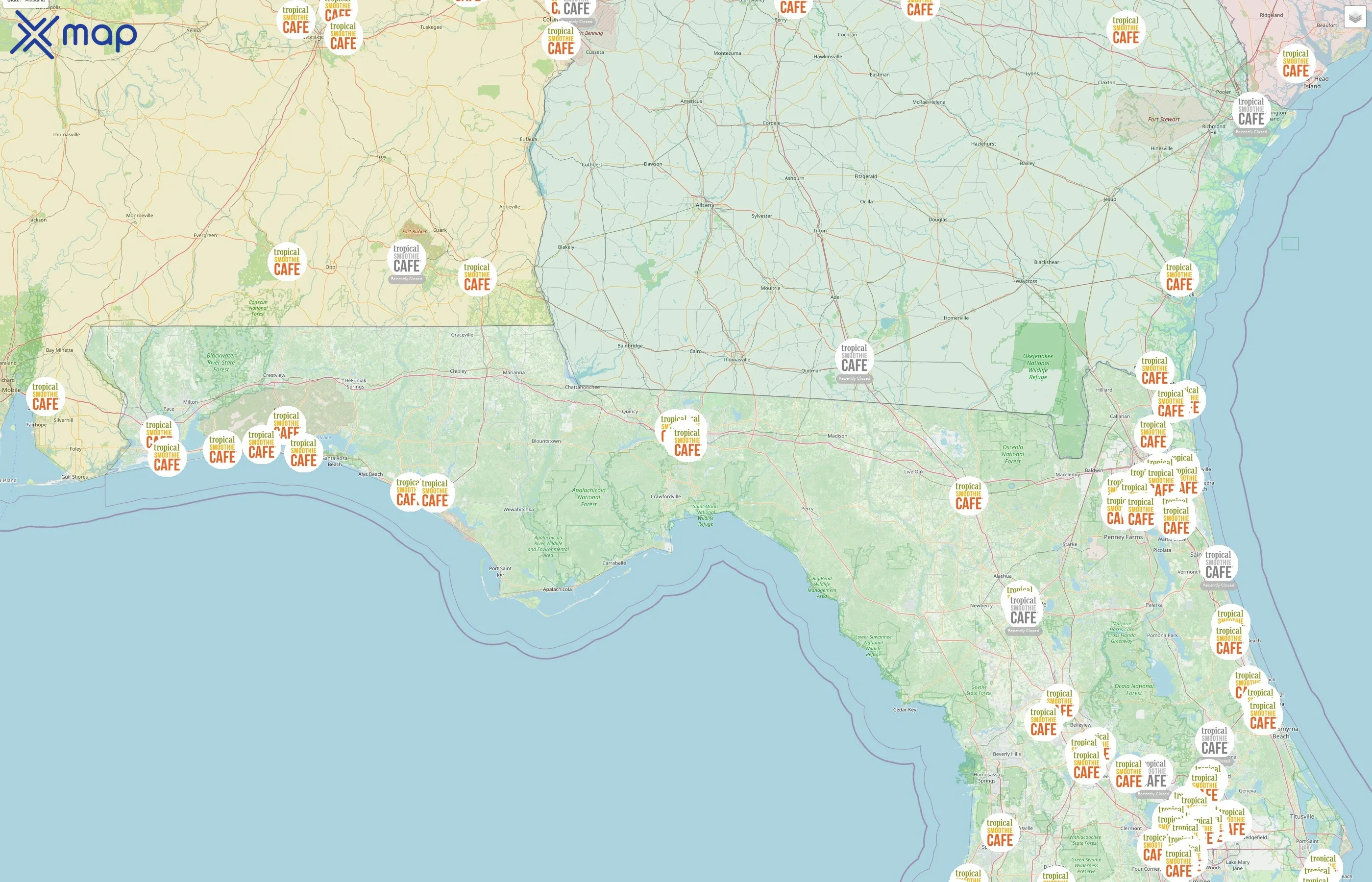
Download Tropical Smoothie Cafe Outlets Points of Interest Data
The complete dataset of Tropical Smoothie Cafe locations across the United States of America is available for download, including coordinates, traffic patterns, and operational status.
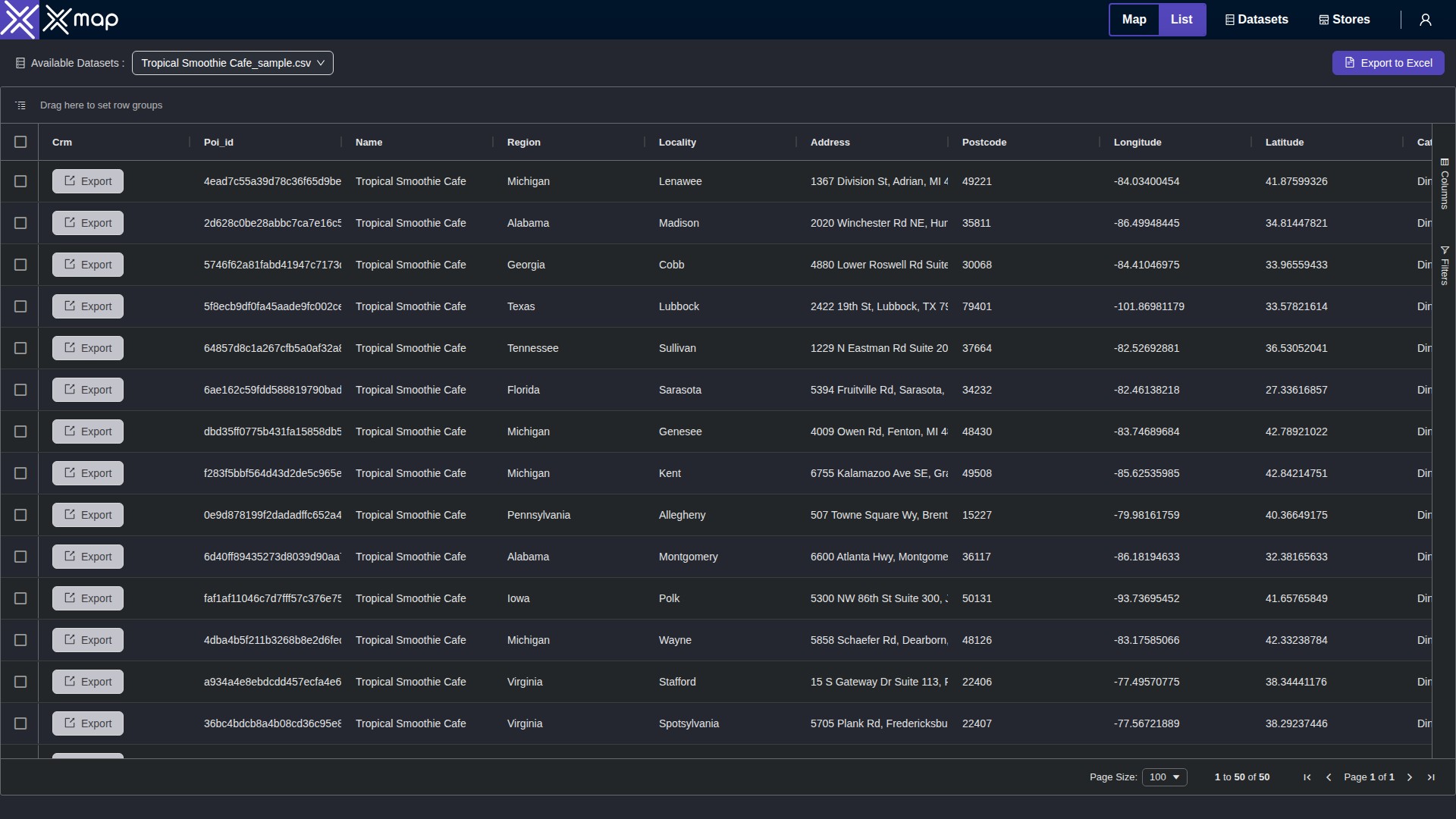
Key Variables for Tropical Smoothie Cafe Points of Interests
Tropical Smoothie Cafe has 1638 locations across the United States of America. The key variables shows the most infleuntial aspects for Tropical Smoothie Cafe locations nationwide. This provides a closer look of how Tropical Smoothie Cafe is operating from different prespectives.
Average Area Covered Per Tropical Smoothie Cafe Locations (By State)
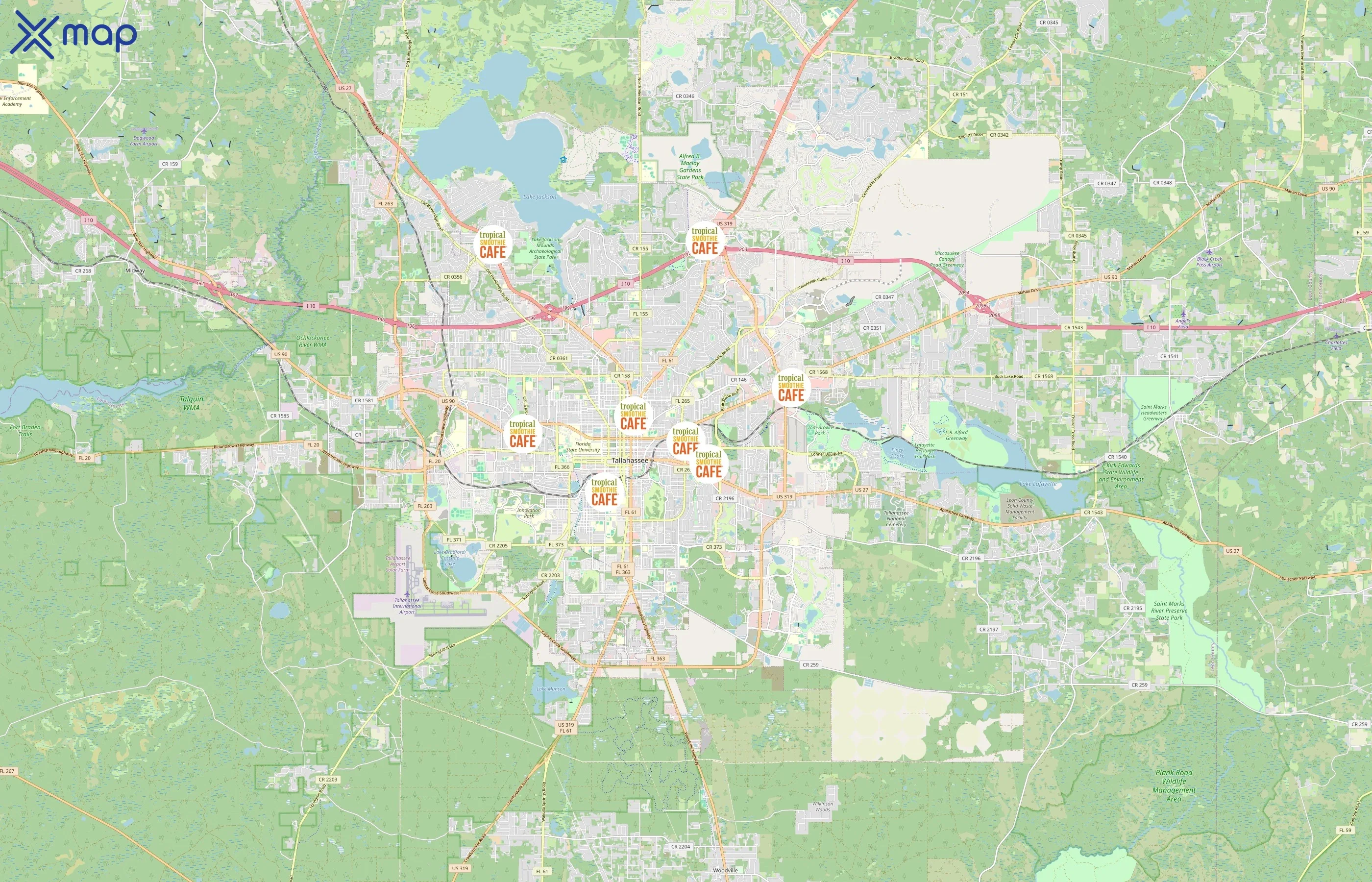
Tropical Smoothie Cafe locations in the United States are distributed across states varying widely in land area. Texas is the largest state by land area at approximately 695,668 km², hosting 151 locations, while Maryland is the smallest at about 32,131 km² with 67 locations. Florida has the highest number of locations at 219, despite a smaller land area of roughly 184,934 km². Other states like Virginia, Michigan, and North Carolina have between 80 and 124 locations across mid-sized land areas.
Business Status of Tropical Smoothie Cafe Locations (Open vs Closed)
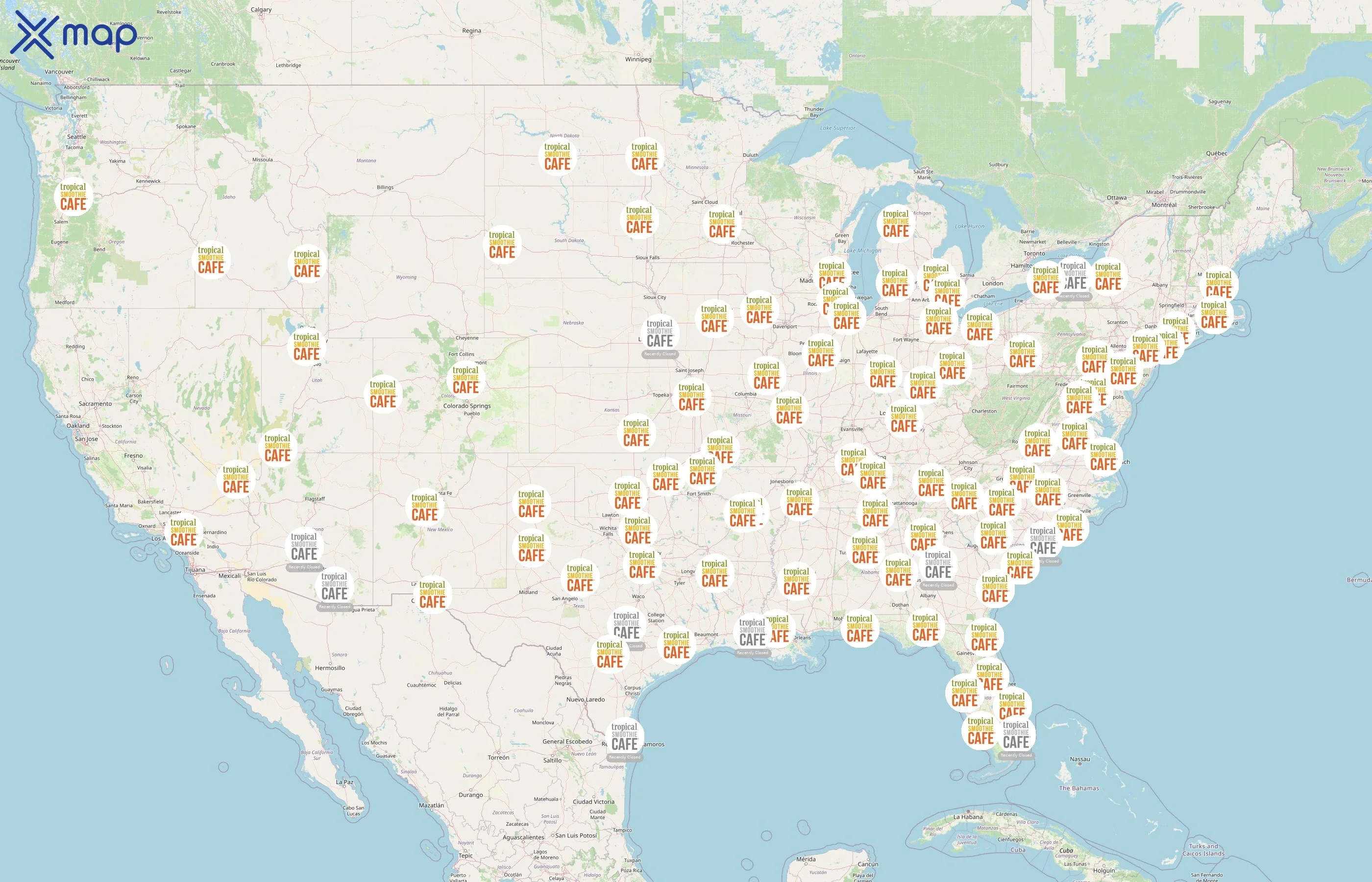
Tropical Smoothie Cafe operates exclusively open locations across its top ten U.S. states, with no closures reported. Florida leads with 219 open stores, followed by Texas with 151 and Virginia with 124. Each listed state maintains a 100% open rate, reflecting consistent business status nationwide.
Traffic Data for Tropical Smoothie Cafe Locations (By State)
This view compares activity near Tropical Smoothie Cafe locations across states. Using traffic scores observed around 1,638 sites, it highlights the busiest markets, states with a high share of above-average locations, and areas where activity is comparatively light. Use it to benchmark performance, prioritize field operations, and spot expansion or optimization opportunities.
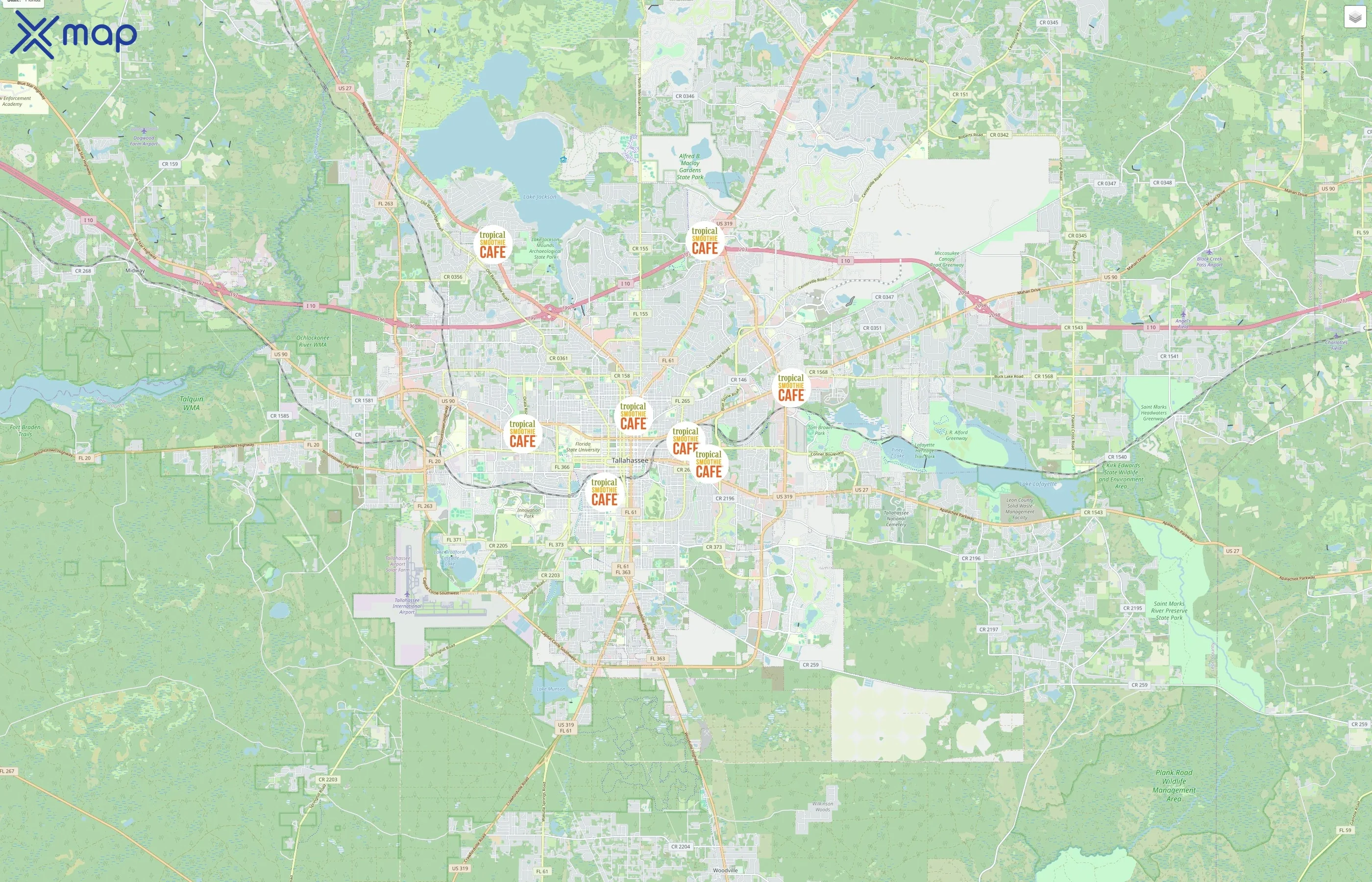
What Tropical Smoothie Cafe locations are busy in top 10 states?
Tropical Smoothie Cafe's busiest locations in the United States are notably concentrated in Michigan, where 25.8% of 120 stores are busy, the highest percentage among the listed states. Florida has the greatest number of busy locations at 51, representing 23.3% of its 219 total stores. Texas follows with 36 busy stores, accounting for 23.8% of 151 total locations. Other states like New York and Ohio also show high busy percentages, with 25.0% and 24.6%, respectively.
Customer Reviews and Ratings of Tropical Smoothie Cafe Locations
This section summarizes customer sentiment toward Tropical Smoothie Cafe. Using ratings and review totals from 1,638 locations, we highlight where scores are consistently high and where feedback volume is greatest. Average star ratings reflect perceived quality, while total reviews indicate engagement and reach across the network.

Average Ratings
Tropical Smoothie Cafe's highest average rating in the United States is in Illinois at 4.3, followed by Ohio with 4.2 and Texas with 4.1. Florida and Michigan both have an average rating of 4.0. Florida leads in total reviews with 63,103, while Michigan and Virginia follow with 45,498 and 28,986 reviews, respectively.
Number of Reviews
Tropical Smoothie Cafe's highest average ratings are in Illinois (4.3), Ohio (4.2), and Texas (4.1). Florida leads in total reviews with 63,103, followed by Michigan with 45,498 and Virginia with 28,986. Texas and North Carolina also have significant review counts, at 27,600 and 18,198 respectively.
Tropical Smoothie Cafe Locations With Verified Contact Information

Contact Information
Tropical Smoothie Cafe has full phone coverage in all listed states across the United States. Florida leads with 219 locations, followed by Texas at 151 and Virginia at 124, each with 100% phone coverage. All ten states, including Michigan, North Carolina, and New York, report complete phone availability for their respective Tropical Smoothie Cafe locations.
Use cases for Tropical Smoothie Cafe Points of Interests Data
Market Analysis
Tropical Smoothie Cafe POI data enables clear measurement of footprint and demand. Analysts can rank states and cities by location count, compare coverage on a per-capita basis, and use traffic scores and review volumes to spot high-performing markets and under-served pockets. The result is an objective view of saturation, growth opportunities, and performance outliers.
Site Selection
For network planning, the data supports scoring candidate trade areas using location density, population per location, and nearby traffic intensity. Teams can evaluate cannibalization risk via nearest-store distance, surface whitespace along key corridors, and prioritize sites near retail anchors, campuses, or transit where observed activity is strongest.
Urban Planning
Planners can map clusters and service gaps to understand commercial access at the neighborhood level. Per-capita coverage highlights communities with limited access, while changes in openings or closures signal shifts in activity. These insights inform corridor revitalization, streetscape and transit planning, and data-driven zoning decisions.
How this xMap's POI data can help businesses?
- Accuracy and Precision: xMap data offers high-accuracy data, which minimizes the chances of wrong decisions based on flawed information.
- Complete Data: With xMap, businesses have access to comprehensive and complete data, effectively filling any knowledge gaps and providing a well-rounded view for decision making.
- Up-to-Date Information: xMap ensures that the data provided is regularly updated, which allows businesses to make dynamic, timely decisions in tune with current trends and situations.
- Scalability: xMap data allows businesses to scale their operations efficiently, by providing insights that cater to varying business sizes and requirements.
- Analytical Power: Utilizing xMap data's analytics can help identify patterns and trends, thus enhancing strategic planning and foresight for businesses.


